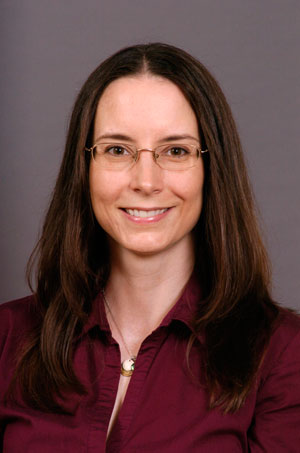Faculty Profile
Sarah St. Angelo
Associate Professor of Chemistry (2006)Contact Information
Rector Science - Stuart Hall
717-254-8957
Bio
Professor St. Angelo's training and research is in the interdisciplinary field of nanochemistry, particularly synthesis, characterization, and applications of metal, mixed metal, and metal oxide nanomaterials. Two ongoing projects in her research group involve developing catalytic nanomaterials for the degradation of pollutants in water. One project uses ultrasmall copper nanoparticles developed in her research lab in chemically mediated catalytic reactions, and another uses hybrid metal oxide and metal nanomaterials for photocatalytic oxidation reactions. Additionally, Professor St. Angelo has partnered with the College Farm on several collaborative course-based projects and student research projects. She regularly teaches Thermodynamics and Kinetics with Lab, Inorganic Chemistry with Lab, General Chemistry, and courses related to nanotechnology. She is also interested in the practice and teaching of scientific writing, communication of science with the public, course-based research, and ethics in science.
Education
- B.S., Denison University, 1997
- Ph.D., The Pennsylvania State University, 2004
2025-2026 Academic Year
Fall 2025
CHEM 131 General Chemistry I with Lab
The first semester of intro chemistry for students majoring in the physical and biological sciences, who have completed one year of HS chemistry but do not place into Chemistry 141. Core principles and applications of chemistry will be covered that will aid students in understanding "Why Chemistry Matters" regardless of discipline. Topics will include: atomic and molecular structure (Lewis, VSEPR), stoichiometry, gas laws, energy and chemical reactions, periodicity, and solubility and intermolecular forces.
Three hours of classroom and three hours of laboratory per week.
CHEM 347 Concepts of Inorganic Chem
This course will cover fundamental concepts in inorganic chemistry to include: periodic trends, atomic and molecular structure, ionic bonding and crystal structures, solubility of ionic solids, acid-base chemistry, structure and bonding in coordination compounds, and reactions of transition metal complexes. Throughout the course the unifying theme will be the application of principles of structure and bonding to predict and explain reactions involving inorganic compounds.
Three hours classroom and four hours of laboratory per week. Prerequisites: 244, 341 or concurrent enrollment.
CHEM 560 Stu/Faculty Collaborative Rsch
Spring 2026
CHEM 244 Thermodynamics and Kinetics
The fundamentals of chemical thermodynamics will be presented with a view towards providing an understanding of the concept of chemical equilibrium. Introductory concepts in chemical kinetics will also be discussed. Laboratory will focus on experiments illustrating the principles of thermodynamics and chemical kinetics.
Three hours classroom and four hours laboratory per week. Prerequisites: 132 or 141, MATH 171 or concurrent enrollment.
CHEM 560 Stu/Faculty Collaborative Rsch
